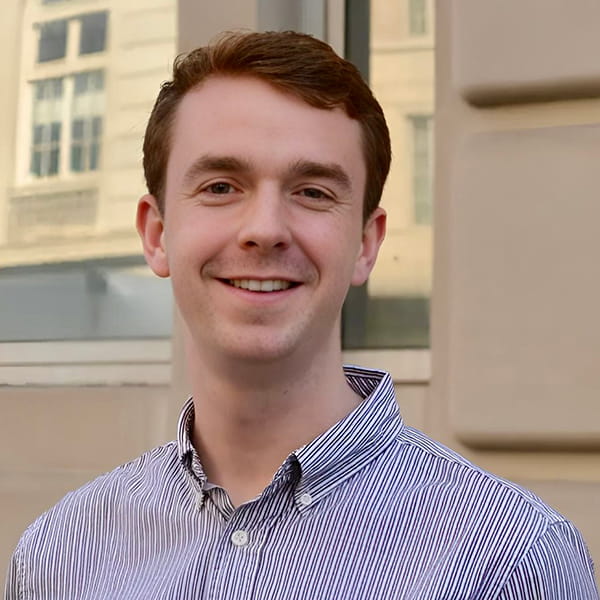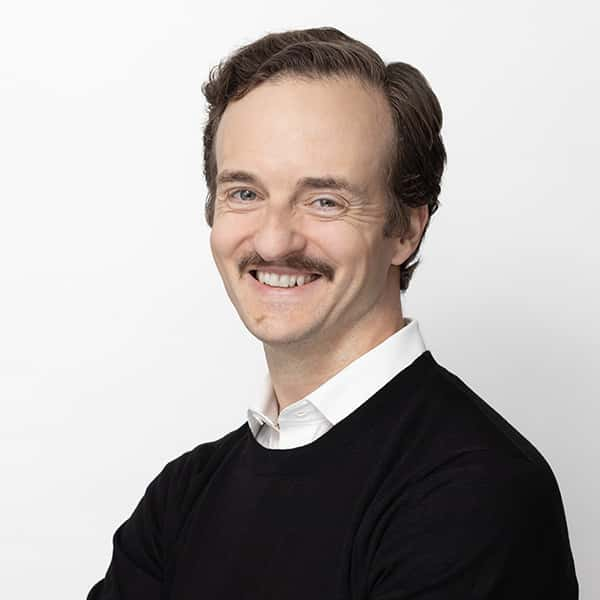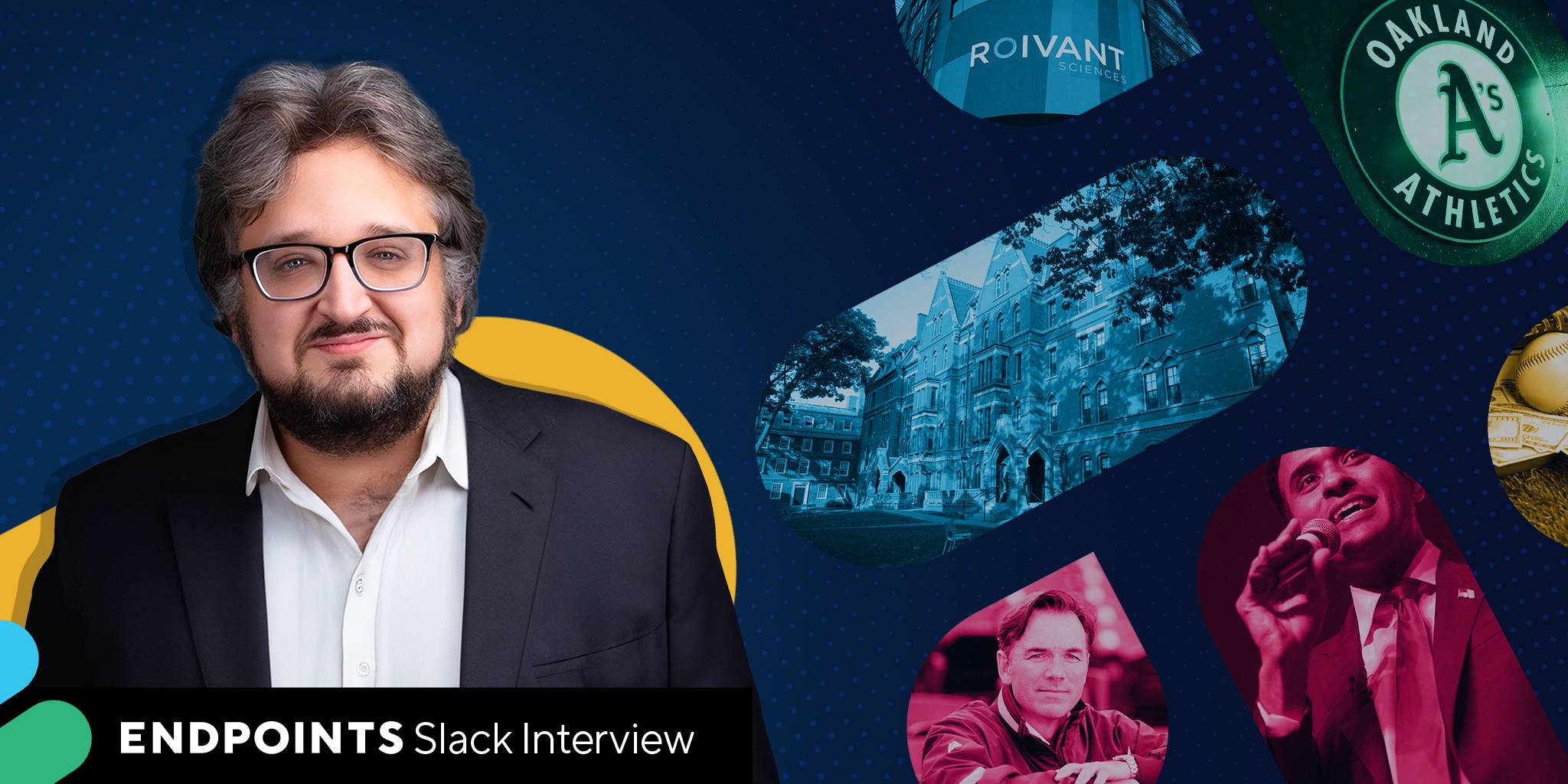As the ink dries on one of biotech’s biggest deals of 2023, Roivant Sciences CEO Matthew Gline popped in the secret Endpoints News Slack channel to discuss the latest with the wheeling-and-dealing biotech.
The 39-year-old ex-Goldman Sachs banker shared his thoughts on the $7.1 billion deal with Roche, playing pharma “moneyball,” and lessons learned working at Lehman Brothers during its final days. There’s also, of course, Vivek Ramaswamy, Roivant’s charismatic founder-turned-presidential-candidate who Gline succeeded.
This conversation has been minimally edited for readability.
 |
| Andrew Dunn |
|
Welcome to Slack, Matt. Are you a baseball fan?
|
|
 |
| Matt Gline |
| I used to be a baseball fan but haven’t had as much time for it recently! |
|
 |
| Andrew Dunn |
| have you read Moneyball? or watched the movie? |
|
 |
| Matt Gline |
| I have read the book AND watched the movie. I’m so glad I’m about to be compared to Brad Pitt. |
|
 |
| Andrew Dunn |
|
you already know where this is going
people love the idea that Roivant is playing moneyball with pharma. what do you make of that comparison? |
|
 |
| Matt Gline |
| I think there’s something to it. I’m not sure I like the name “moneyball,” insofar as I think it implies something about a values system, but I think if the idea is that we’re bringing our own sort of rigor and our own true north to a marketplace that follows a different set of norms, I think it’s apt. |
|
 |
| Andrew Dunn |
|
at least in the baseball version, there’s this less discussed element of trading established players, particularly when they’re valued highly by conventional metrics. When you think of your approach to biotech, is that also a key part of Roivant’s strategy?
|
|
 |
| Matt Gline |
Heh, it’s a fair question this week
Look, I think we are really focused on finding the places where we can add the most value (for patients, and for other stakeholders), and a part of that has to be looking at the opportunity set for everything we’re working on.
The TL1A program is awesome. It’s a great target. There’s definitely a part of me that’s sad to have to hand it off to someone else here. But also Roche is going to do a great job with it, and doing this deal has a transformational potential for us.
I think implicit in the moneyball analogy is maybe some sense that those star players are “overvalued,” and I’m not prepared to say that’s true about Roche and the TL1A – I think they’re getting a real gem of a program. But also I think that in the sport we’re playing we’re going to be able to build a great ‘roster’ by making this ‘trade.’ |
|
 |
| Andrew Dunn |
|
very wise to not call the star player overvalued as they are still packing their bags!
i want to get to the transformational potential next but first
this feels like an only-in-2023 biotech moment. You effectively turn $50 million into $5 billion in less than a year. But Roivant’s stock has fallen more than 10% since the deal was announced. What’s that stock move tell us about … the deal, biotech today, if the market still doesn’t fully get what Roivant is trying to do? |
|
|
 |
| Matt Gline |
|
I’m glad it’s an only-in-2023 moment because it’ll be 2024 in the blink of an eye!
There are a lot of factors at play here. It’s a tough market, we’re a very liquid stock. In the current tape a lot of people are playing for near term company-wide M&A because that’s what will help their year, and this transaction is probably rightly perceived as making that less likely before the end of December. We are only relatively recently public in absolute terms and some of our shareholders literally didn’t do meaningful work on any program other than the TL1A, so there’s some natural rotation to occur. And we got on the phone and said “we’re taking in all this capital and asking you to be patient as we think carefully and deliberately about how to allocate it,” which I think some people probably interpreted as “you don’t need to own our stock right now, you can wait until we tell you what we’re up to.”
That said, it stings a little to be valued under cash, because it implies people think we may not be productive in deploying capital and I would have hoped that our whole history, and most definitely including this transaction, suggests we can be efficient stewards. |
|
 |
| Andrew Dunn |
|
Right. Were you surprised by that drop?
You obviously have a good sense of investors’ pulses and what they wanted/dreamed of |
|
|
 |
| Matt Gline |
| I try to avoid prognosticating on share price reactions to events – it’s always hard to call. I was probably a little surprised, to be honest. I didn’t expect this to be immediately perceived as a lights-out positive outcome for the stock – I think a lot of investors sort of assumed this program was worth something similar to what we got for it, because they had the RXDX proxy and because aspects of this deal were rumored in the press over the summer. But I’m not sure I expected the stock to trade down. |
|
 |
| Andrew Dunn |
|
Looking ahead, how are you thinking about spending that cash?
In particular, to go back to your transformational potential idea: any changes in what this balance sheet allows Roivant to consider in deal size or the number of deals? |
|
|
 |
| Matt Gline |
| Surely you read our transcript or listened to our call, where we asked everyone to be patient before we answered that question? |
|
 |
| Andrew Dunn |
|
I’m a reporter
I have no patience |
|
|
 |
| Matt Gline |
|
And now you understand the stock price reaction! No I’m kidding.
Look, there are a few ingredients. We have our existing pipeline, which is still in our view the most exciting I&I pipeline in biotech – we think we have a best in class anti-FcRN antibody, we think brepocitinib is an incredibly exciting drug, we are optimistic about VTAMA, the list goes on. And now we have the resources to truly properly invest in those programs where it makes sense.
And then there’s the external opportunities. I still think it’s probably not in our DNA to “blow it all in one place,” as it were – I’m sure we’ll get pitched on lots of public biotech M&A stories, and I’m not sure we’re ever going to do anything like that of significant size.
But the other truth is, actually in-licensing the TL1A a year ago was a pretty tough decision, though it maybe doesn’t seem like it should have been in hindsight. There was a lot of risk – we didn’t know what the RXDX data or our own full maintenance data would look like, etc. And most importantly those were expensive studies, easily mid-nine-figures in total.
The implicit conclusion there is, now we can approach similar opportunities with even higher conviction. |
|
 |
| Andrew Dunn |
|
Gotcha. I wanted to pivot to a convo I was having with my editor, Drew Armstrong, who used to be at Bloomberg
You two share a unique situation in having your boss run for president. Drew mentioned how it was legitimately challenging, it being a distraction even in telling everyone how it’s not a distraction |
|
|
 |
| Matt Gline |
| It IS a distraction telling people it’s not a distraction. |
|
 |
| Drew Armstrong |
| Andy is putting this much more gently than I did |
|
 |
| Andrew Dunn |
| Stronger language may have been used |
|
 |
| Matt Gline |
|
I suspect our situation is slightly different from Bloomberg’s – his name isn’t on the door here.
And I think Bloomberg is now back to running Bloomberg, is that right? I haven’t followed closely. While Vivek has truly separated himself from the operation of the business.
Mostly I can truly say it hasn’t mattered a lot. Investors have judged us largely, frankly, for things that have happened since he left – the acquisition of the TL1A, the development of IMVT-1402, the launch of VTAMA, etc. |
|
 |
| Andrew Dunn |
| How big of a challenge has it been? Even if it doesn’t matter too much with investors |
|
 |
| Matt Gline |
| It means that I’ve spent a lot of time talking to journalists who have been trying to catch me off-guard with a juicy quote to foment conflict. |
|
 |
| Andrew Dunn |
|
Surely not me!
But that sounds about right |
|
|
 |
| Matt Gline |
|
Well Slack is a bad format for that, because I get to read my comments before I hit send!
Aspects of it are challenging.
Founder/CEO transitions are historically difficult things. I actually think we’ve been fortunate at how easy ours has been in a lot of ways. One thing that sometimes happens is a departing founder isn’t willing to hand over the reins, and Vivek took on a task that kept him so busy that was never going to be an issue for us.
So that’s been good. We had the transitional period where he was on the board to help.
It’s challenging because he’s outspoken and has strong opinions on… many topics, and many of those opinions are different from mine. And I think sometimes our employee population has wondered if he was still speaking for the company, and I’ve had to reinforce the truth, that he is not.
And it’s challenging because we want people to focus on what we’re actually doing — developing medicines — and it’s just a reason for people to look at Roivant through some other lens, and that doesn’t help us do our job better. |
|
 |
| Andrew Dunn |
| And where’s the relationship stand now with Vivek? He’s not on the board, but still owns over 10% of Roivant, at least as of the last filing I found. How often do you two talk? |
|
 |
| Matt Gline |
| Infrequently, but sometimes. He shares opinions like any outside shareholder might, and sometimes I make him listen to my political opinions for fun. |
|
 |
| Andrew Dunn |
| Infrequently – like once a week? A month? Quarter? |
|
 |
| Matt Gline |
|
I think he’s proud of what he built in his time here, and proud to see it thriving after he’s left.
I haven’t gone back and looked at my phone or text logs. But he’s pretty busy.
(And so am I!)
How often did Drew talk to Michael while he was running? |
|
 |
| Andrew Dunn |
| If Drew remains in the Slack ether, I would summon him now |
|
 |
| Drew Armstrong |
| Matt’s question over-assumes my importance |
|
 |
| Matt Gline |
| Surely not, Drew. How often would you have wanted to speak to him? |
|
 |
| Drew Armstrong |
|
So, I truly will go back into lurk mode, but i pushed Andy to ask this one in part because, unlike almost anything else an owner/founder/shareholder might do, the presidency or running for it is just so huge that it touches everything, no matter what walls or rules you set up. It always felt like a unique and unsolvable problem. Or at least not one with a satisfying solution.
And I (and I think I can speak for others) was glad when that was over, just from the sake of the distraction it represented to the work we wanted to do.
So I am both sympathetic, and curious |
|
 |
| Matt Gline |
|
I like drawing you out of the shadows.
It’s probably unique. I’m sure the degree to which it impacts us will depend over time a lot on how it goes for him. And in truth, a part of me will be happy when it’s over so we can keep doing the (already pretty hard) job of trying to develop drugs in a crazy biotech market.
But I also think it probably has mattered less than we anticipated it might because he’s done such a thorough job of extricating himself from Roivant. I think it’s helpful that he started Strive after leaving, because we aren’t even his most recent venture.
In all honesty, and I appreciate this may sound snarky in an interview, the hardest part has been dealing with journalists who cover politics, because journalists who cover Roivant, even when they want to write a critical piece, are truly looking to engage with what’s important to the business. Journalists who are covering him as a politician don’t really care for the most part what the story means for Roivant, so if there’s a tiny thread to pull on that makes for a good political story they want to find that thread and pull on it.
I think there haven’t been too many of those threads, to be honest, but we’ve spent more time talking about Axovant, where the lead program failed in 2017, than I think we would otherwise. And our DEI programming – of which I am proud, though there’s always more work to do – has gotten as much ink as some of our late stage drugs. |
|
 |
| Andrew Dunn |
|
I appreciate the candor – it’s genuinely fascinating
Let’s pivot back to the real star of this Slack though – in particular a 2006 vintage of Matt Gline |
|
|
 |
| Matt Gline |
|
I did!
Actually, on a sad note, I was recently reflecting on that because one of my Crimson editors, a classmate of mine, passed away unexpectedly. |
|
 |
| Andrew Dunn |
| I’m sorry to hear that, Matt. As someone who also loved their student paper, there are some real special, weird bonds from those times |
|
|
 |
| Matt Gline |
| Yeah it’s a weird thing. I loved writing that column, though, at the time. |
|
 |
| Andrew Dunn |
|
“Technology, properly distributed, is a great equalizer as well: it gives little guys with big ideas a chance to compete against big guys with little ideas.”
That feels very 2006 reading it today, in the era of idealism and the little guys being Facebook and Google then most likely
Looking at that now, how does that hold up? What surprises you most about how technology has changed? |
|
|
 |
| Matt Gline |
|
Yeah that’s a fair take. I definitely couldn’t have predicted in the early days of Facebook what social media would become. X/Twitter has been a very hard place the last few weeks.
I’m still an optimist on the promise of it all. I think it’s easy to miss some of the day to day things. My toddler facetimes with his grandparents, even on occasions where they’re separated by thousands of miles. My wife communicates with teammates of hers in West Africa via Whatsapp every day.
And I think (I hope) at least some of it is coming for our broken healthcare system, which needs all the help it can get.
We are certainly working on pieces of that at Roivant.
But also, and I probably should have seen this coming but I was just a college student and not cynical enough, the scale of it and the financial impact of it has had a distorting impact that’s hard to process.
I was a ‘late joiner of the early internet,’ is probably how I’d put it. So I sort of remember the last vestiges of this weird bottoms-up hacker-built academic place, and it wasn’t perfect but the homebrew feel of it was, in hindsight, in many ways a lot more benign than what we have now. |
|
 |
| Andrew Dunn |
|
To jump to today, AI feels like the seminal technology now, both in biotech and broadly. Do you agree with that 2006 sentiment when thinking about AI, in little guys with big ideas being able to genuinely compete?
Or have you gotten a shade more cynical since college (gasp) |
|
|
 |
| Matt Gline |
|
I think it’s hard to tell what AI is or will become in the current moment of it, because it’s gotten so heavily hyped. I think it’s interesting – I don’t find ChatGPT that helpful day to day, for whatever reason, and so I’ve been skeptical of the extent to which this wave of stuff is going to matter. But I was recently doing a video superday where I met with a half dozen candidates for our analyst rotational program, and I asked them how many of them used ChatGPT in their daily life, and I think literally all of them raised their hands.
So it’s coming for us, one way or another. It’s an overloaded term that refers to data science, and machine learning, and excel spreadsheets, and then to large language models and diffusion and all kinds of really sophisticated tools.
I’m cautiously interested to see where it all goes, and would like to find ways to use the ones that can help us to make Roivant better or my life easier.
Some of the current boosterism online feels a little like AI-is-the-new-crypto, but I’m sure some of this new generation of tools and companies will come out mattering a lot.
I have definitely gotten more cynical since college. |
|
 |
| Andrew Dunn |
| Let’s close with a rapid-fire round: few final Q’s, also on your background if that sounds good |
|
|
 |
| Andrew Dunn |
|
Well, speaking of cynicism, let me jump to what may be one contributor.
You spent a decade at banks before Roivant — Goldman, Lehman, Barclays
What were your favorite & least favorite parts of working in banking? |
|
|
 |
| Matt Gline |
|
The cool part about banking, in the right role, is that many of the most interesting companies in the world come to you at their most interesting moment. They’re thinking of a major, transformative transaction, and they’re asking you to work on it. The worst part about banking is when you get a deal done, that’s your finish line even though it’s just the beginning for your client. You go out to a nice dinner, your boss cashes a check, and you move on to the next one. The great thing about working at a startup (and I think we are still a startup) is for better or for worse you own those problems and the only way out is through.
Also, financial problems are generally interesting and complicated, and I feel like understanding some small piece of how the financial markets work has served me well as I’ve turned my attention to other complicated interesting problems. |
|
 |
| Andrew Dunn |
| What were the biggest lessons you learned from being at Lehman when it collapsed in 2008? |
|
|
 |
| Matt Gline |
|
I was very early in my career, and it was probably interesting being at the center of a major global event and seeing different perspectives on it. There were protestors outside the building shouting that they hoped I lost my villa. So that was interesting. I don’t have a villa, still.
That said, one lesson that is as true for biotech as it was for Lehman: staying alive is a pre-requisite to everything else. |
|
 |
| Andrew Dunn |
| Final Q: What deal, personally, has been the favorite you’ve been a part of making – either at the banks or Roivant? And what deal do you most regret either passing on or not making? |
|
|
 |
| Matt Gline |
|
Our Sumitomo deal was special for me. It was truly mine – I went to Japan 15 times in like 10 months, and they came here as often. We needed each other. I built some real, durable, lasting relationships that spanned many continents and time zones. It was an incredibly important deal for Roivant, and it was clarifying doing work that really, really mattered. And it was just fun to pull together. We had a great team working on it.
It’s easy to list missed opportunities. A bunch of VC firms have pages of their failures, which are lists of companies they passed on that went on to make it big. We had tried to in-license the IL-17af that is now the main asset at Moonlake and that looks like a great drug. But the truth is the opportunities you don’t take never stick out that sharply in the rear-view mirror, it’s just too busy. So it’s hard to know. |
|
 |
| Andrew Dunn |
|
Matt, this was genuinely a blast.
I even got to drag in my editor and have him discuss Michael Bloomberg, so thank you for that and for taking the time. Who should we invite next to the Slack room? |
|
|
 |
| Drew Armstrong |
|
+1 — thanks for doing this, and apologies to andy for awkwardly wading in.
really enjoyed it |
|
 |
| Matt Gline |
|
Well our President and CIO Mayukh is also a great guy
So you could do him? |
|
 |
| Andrew Dunn |
| A company man answer, I have to respect that. (I have talked to Mayukh and really enjoyed it as well, so open to that!) |
|
|
 |
| Matt Gline |
| There are a lot of great people in biotech. It’s an industry that attracts colorful characters. |
|
 |
| Andrew Dunn |
| That’s why I love covering it too — thanks again Matt, really appreciate you taking the hour. |
|
|
 |
| Matt Gline |
|
Thank you
Have a great day! |
|
Check out other interviews with Cellino CEO Nabiha Saklayen, Lux Capital’s Josh Wolfe, and NewLimit’s Jacob Kimmel.
AUTHOR
Senior Biopharma Correspondent





























































